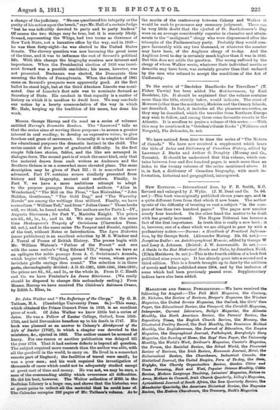Dr. John Walker and " The Sufferings of the Clergy." By
G. B. Tatham, M.A. (Cambridge University Press. 6s.)—This essay, which obtained the Prince Consort Prize in 1910, is an eernA/Ant piece of work. Of John Walker we know little but a series of dates. He was a Fellow of Exeter College, Oxford, from 1696- 1700, and held Devonshire benefices up to his death in 1747. His book was planned as an answer to Calamy's Abridgment of the Life of Baxter (1702), in which a chapter was devoted to the ministers, &c., ejected in 1662. The author cannot be accused of hurry. For one reason or another publication was delayed till the year 1714. That it had serious defects is beyond all question. The subject required more research than the author was able, with all the goodwill in the world, to carry on. He lived in a somewhat remote part of England ; the facilities of travel were small; he was a poor man ; and his work required the investigation of thousands of cases which could not be adequately studied except at great cost of time and money. He was not, we may bo sure, a man of the commanding ability which overcomes all difficulties. He did his best, however. The Walter collection of MSS in the Bodleian Library is a large one, and shows that tho historian was at great pains to collect all the material that he could hear of. The Calendar occupies 236 pages of Mr. Tatham's volume. As to the merits of the controversy between Calamy and Walker it would be rash to pronounce any summary judgment. There can be very little doubt that the ejected of St. Bartholomew's Day were on an average considerably superior in character and attain- ments to the "malignant" clergy who were dispossessed alter the triumphs of the Parliamentary party. Probably they would com- pare favourably with any two thousand, or whatever the number may have been, of the Anglican clergy of to-day. And the Anglican level to-day is certainly much higher than it was in 1640. But this does not settle the question. The wrong suffered by the clergy of whom Walker wrote, whatever their individual merits or demerits may have been, was certainly greater than that endured by the men who refused to accept the conditions of the Act of Uniformity.






































 Previous page
Previous page